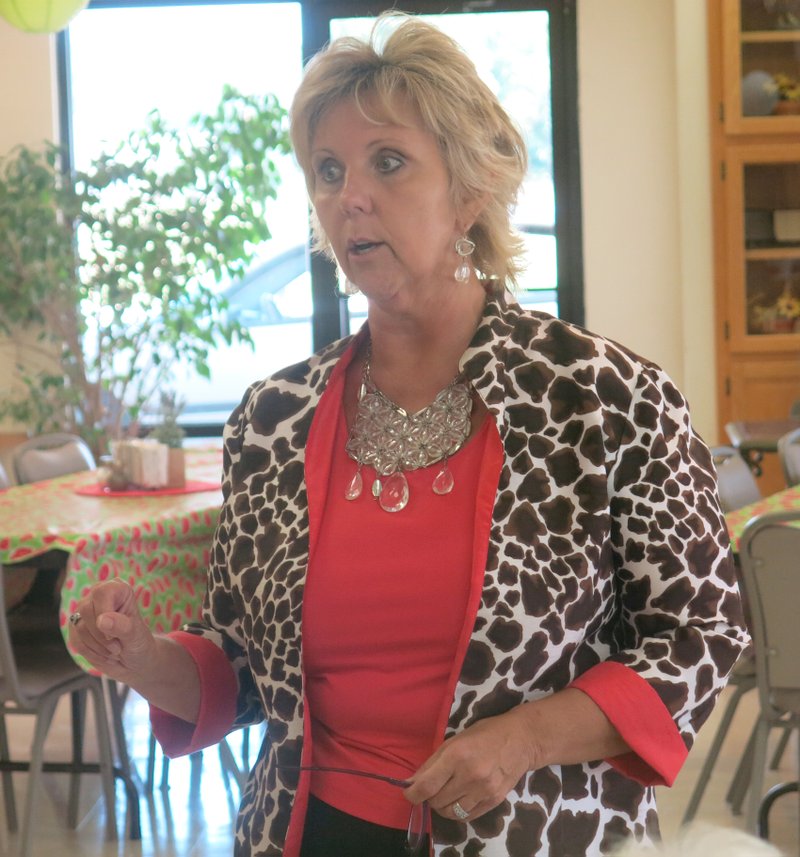GRAVETTE -- An Alzheimer's awareness meeting was held last Thursday afternoon at the Billy V. Hall Senior Activity and Wellness Center. The meeting was to launch an Alzheimer's support group for family members and caregivers of Alzheimer's patients. The meetings will be conducted by Susie Davis, care coordinator from Ozarks Community Hospital, and guest speakers who will be speaking on related topics.
Meetings will be held from 1 to 2 p.m. the second Thursday of each month at the Billy V. Hall Senior Center.
Ten persons attended Thursday's inaugural get-acquainted meeting, which covered the basics of Alzheimer's. Class members were given "Caring for a Person with Alzheimer's Disease," a guide to understanding Alzheimer's, caring for the person with the disease and meeting the caregiver's own needs.
Davis, a former employee of the Alzheimer's Association, is certified for support group training through Alzheimer's Arkansas. She said the next session, on Thursday, Oct. 8, will focus on stages of the Alzheimer's disease and what they mean. Future sessions will deal with such topics as caregiver stress, patient behaviors, creating a daily plan, questions to ask one's doctor and planning ahead for the time a patient can no longer drive or conduct his or her own business. Guest speakers will include doctors, pharmacists, nurses and elder-care lawyers.
The Alzheimer's support group was created because of a growing need for Alzheimer's awareness. Davis said the disease seems to be more widespread, and among persons of a younger age, but it is probably just because the disease is being diagnosed sooner. She said she had dealt with five people between the ages of 50 and 60 who had been diagnosed with Alzheimer's in the last year.
Alzheimer's is the only disease with no cure or even any means of slowing the ailment. "Nothing really works," Davis said, but she noted several clinical trials are being conducted to help combat the disease. However, clinical trials are slow in providing information and a trial must involve at least 1,000 people, she said, before the government will act on the information.
Davis reassured persons whose memories are failing and wonder if they have Alzheimer's. If you're just having trouble remembering names or are misplacing your car keys, you probably don't have Alzheimer's.
"As long as you can remember that you forgot, you're okay," she said. Only when a person's memory loss begins to interfere with the normal activities of daily living is a diagnosis of Alzheimer's confirmed.
Davis suggested ways for persons to keep their mind sharp and their memory functioning well. She said it was good to do word search and crossword puzzles, to take a different route on one's daily walks just to see things from a different perspective, even to wear one's watch on the opposite arm for a change to stimulate a different area of the brain. Exercise and a healthy diet are also important. She recommended going to a gerontologist or a neurologist if a person had symptoms that concerned them.
Group members had several questions which Davis addressed. One concerned the Alzheimer's patient's habit of wandering away from home. She noted that it was wise to call 911 when this happens because a person can sometimes cover quite a bit of distance in a short time. She said studies had found that a person usually wanders in the direction of their dominant hand. So a right-handed patient would be likely to turn right when they left the house. She told members they could sign up to receive "Silver Alerts" whenever a person with Alzheimer's is missing.
Davis stressed the importance of socialization for the Alzheimer's patient. She said the person should be taken out to socialize whenever possible and avoid isolation. She noted that she had seen a sharp decline in her mother when she was left alone. The isolated patient's whole attitude changes and he or she tends to withdraw. Nursing homes are understaffed and sometimes it is up to the family to provide the socialization.
"Interaction is important, whether we realize it or not," she said, and said she would rather live a better, full life, than a longer one. Quality of life, not quantity, should be the focus, she said.
Persons caring for Alzheimer's patients should check into services available to help them, she said. Medicare pays for home health, she said, but not home care. Medicaid, however, will pay for home care. A number of home healthcare services, healthcare equipment providers and therapists are available in the area.
Davis invites everyone in the area who is a family member, friend or caregiver of an Alzheimer's patient to join the support group and provide her with topics they are interested in discussing. She urged everyone to attend the Ozarks Community Hospital open house this Thursday and see the new Living Well Holistic Center, which is designed to provide an alternative to an inpatient behavioral care unit.
Davis can be contacted at OCH, 479-787-5291, or by email at [email protected]. Coffee and light snacks will be provided at each support group session. She asked anyone interested in helping sponsor the sessions and providing refreshments for a meeting to call her and let her know.
General News on 09/23/2015
